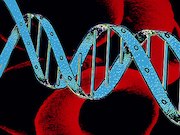CD34+ cells transduced with BB305 vector lowered or eliminated need for red-cell transfusions
THURSDAY, April 19, 2018 (HealthDay News) — For patients with severe β-thalassemia, the need for red-cell transfusions can be reduced or eliminated by transducing cells with the LentiGlobin BB305 vector, according to a study published in the April 18 issue of the New England Journal of Medicine.
Alexis A. Thompson, M.D., M.P.H., from the Northwestern University Feinberg School of Medicine in Chicago, and colleagues obtained mobilized autologous CD34+ cells from 22 patients with transfusion-dependent β-thalassemia and transduced the cells with LentiGlobin BB305 vector, which encodes adult hemoglobin with a T87Q amino acid substitution. After patients underwent myeloablative busulfan conditioning, the cells were reinfused and patients were monitored for adverse events, vector integration, and levels of replication-competent lentivirus.
The researchers found that all but one of the 13 patients with a non-β0/β0 genotype had stopped receiving red-cell transfusions at a median of 26 months after infusion of the gene-modified cells. In evaluated patients with hemoglobin levels near normal ranges, correction of biologic markers of dyserythropoiesis was achieved. The median annualized transfusion volume was decreased by 73 percent in nine patients with a β0/β0 genotype or two copies of the IVS1-110 mutation. In three patients, red-cell transfusions were discontinued. Adverse events related to treatment were typical of those associated with autologous stem-cell transplantation.
“Gene therapy with autologous CD34+ cells transduced with the BB305 vector reduced or eliminated the need for long-term red-cell transfusions in 22 patients with severe β-thalassemia without serious adverse events related to the drug product,” the authors write.
The study was funded by Bluebird Bio.
Abstract/Full Text (subscription or payment may be required)
Editorial (subscription or payment may be required)
Copyright © 2018 HealthDay. All rights reserved.








